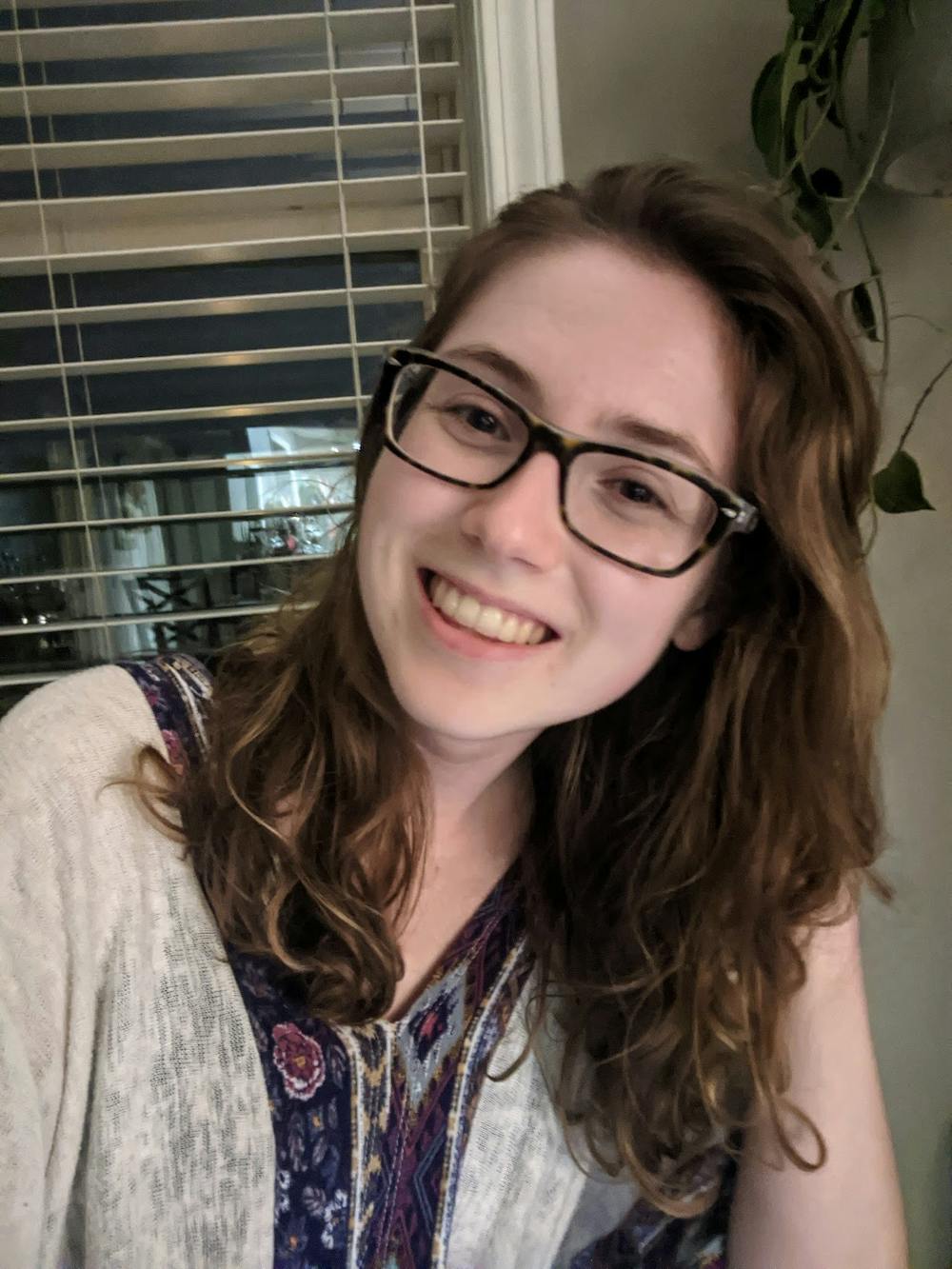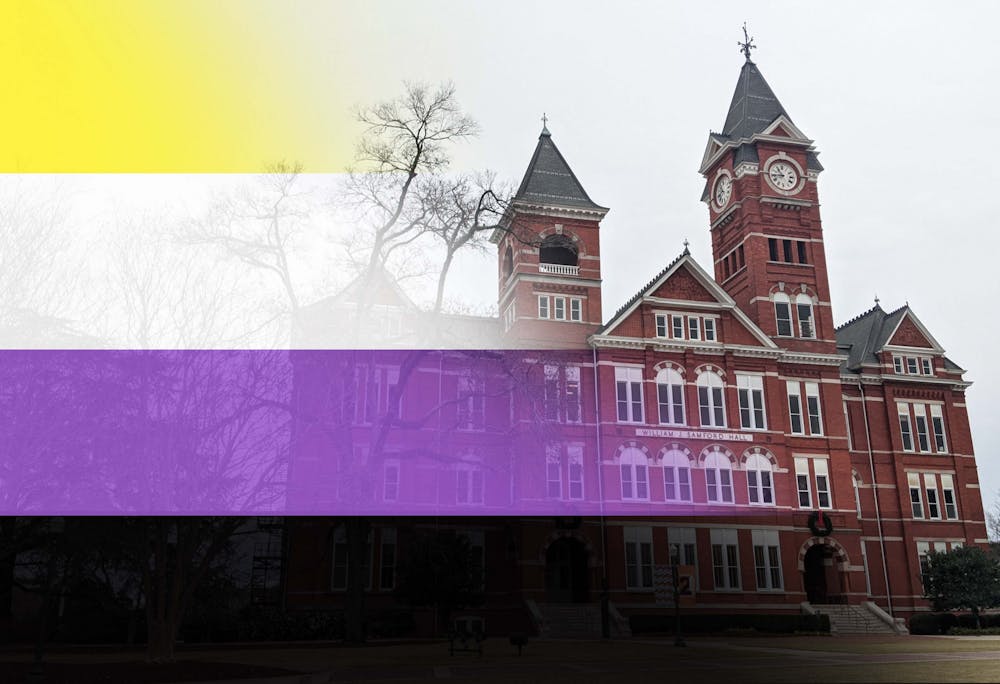After being repeatedly misgendered in class, a student at Auburn University went to their advisor to discuss this issue. In response, the adviser showed them the inclusivity website and the conversation ended there.
Noa Hunter, sophomore in mathematics, said after this exchange, they realized they had wasted their time.
Hunter identifies as nonbinary, someone who does not identify as a man or a woman. While the University does not have an official record of how many students are nonbinary, as of June 2021, a study by UCLA’s Williams Institute found 1.2 million adults in the U.S. identify as nonbinary. For further explanation on gender identity terminology click here.
Auburn University offers Safe Zone training, Spectrum: the Gay-Straight Alliance, the ability to change pronouns in Banner operating systems and an all-gender restroom map to help provide gender inclusivity for students who aren’t cisgender. Kamden Strunk, associate professor in education research, said having university policies helps, but students truly feel the impact on a cultural level.
Hunter said they know it’s not fair to ask the University to change the community around them, but having more university staff, faculty and students be courteous toward gender identity would be a start. As of now, they said Auburn doesn’t feel like a safe place.
“It’s almost ridiculous,” Hunter said. “I pay to go here. I pay tuition. I’m paying for a service, and then I can’t really enjoy the service because I’m afraid for my safety.”
Hunter said while they don’t feel they will get physically assaulted on campus, that doesn’t mean there is not a concern about hate crimes or assaults off campus. They said, based on the emails about on-campus sexual assaults from last semester, they wonder how much action the University would take if a hate crime or an assault were to occur.
But it’s the little things that make being nonbinary difficult at Auburn, they said. Whenever they walk down Haley concourse, they feel all eyes on them. These daily occurrences made Hunter almost leave Auburn freshman year, but they had signed a lease, so they stuck it out.
“I hated walking on campus,” Hunter said. “I hated having in-person classes. I hated almost every interaction I had with somebody on campus, even if it was supportive because it was still pointing me out as an openly queer person.”
The only thing that has changed from this year to last year is more people are on campus so it can be harder to spot them in a sea of people, they said.
Strunk said providing true gender inclusivity on campus is slowed because the University is a bureaucracy. While the Office of Inclusivity and Diversity would step in regarding a safety issue, he said they don’t have decision-making power. Inclusivity, in general, relies on every department to be held accountable, he said.
“The provost or facilities or student life is who’s really in charge of the things that are happening with students,” Strunk said. “I think it’s sort of a mistake for us to turn to OID for answers on these things because they’re really public relations.”
Safe Zone training
Taffye Clayton, vice president and associate provost of the Office of Inclusivity and Diversity, said one way they try to spread gender identity awareness to the whole campus is through Safe Zone training.
“The Safe Zone training is interactive, four-hour training designed to educate faculty, staff and students about sexual orientation and gender identity including education on pronouns and tools to ensure all students feel safe, accepted and valued,” she said.
Brandy Smith, assistant director for training at Student Counseling and Psychological Services, runs the Safe Zone trainings. Smith said she focuses each training on what would be most helpful for those attending. There are scenarios they run through to help teach attendees how to handle certain situations regarding different sexual orientations and gender identities.
“I view it as that two-pronged approach,” she said. “We want to help more of our campus and community feel more confident reacting to situations, and we also want to do more proactively so that students know that they are going to be valued and have a place of belonging. Because Auburn University in Auburn, Alabama, is oftentimes not where LGBTQ+ students, faculty, staff or even allies, feel like they can be safe.”
Safe Zone training is offered but not required. Smith said a decent number of people have taken them and then some of these people leave, but she said she hopes they carry this information with them to their next area.
Campus Pride Index Initiative Committee
In 2020, the CPI initiative committees were formed of faculty, staff and members of the student body with the goal of increasing Auburn’s Campus Pride Index. The Campus Pride Index is an evaluation for colleges on being LGBTQ+ friendly.
Currently, Auburn University’s score is 2.5 out of 5 with some of the lowest scored sections being “LGBTQ Policy Inclusion,” “LGBTQ Campus Safety” and “LGBTQ Recruitment & Retention Efforts.”
Mary Grace Vinson, graduate student in social work and a nonbinary student, was on one of these committees. They said while the idea was good, the problem was the committees didn’t have any power beyond giving the University recommendations.
“Fundamentally, it was geared toward PR,” they said. “It was geared toward making us look better and toward making the people who had been complaining be quiet, and they [the committees] all fizzled out without much of any impact.”
Vinson said the committees were also not structured enough with few instructions. Additionally, they said the committees were flawed from the start as the focus was on improving a score rather than helping students, “which is inherently performative.”
Spectrum: the Gay-Straight Alliance
Spectrum is Auburn University’s on-campus Gay-Straight Alliance organization that holds weekly meetings and concourse days. While the organization provides a space for LGBTQ+ students and allies, Vinson and Hunter said one space to cover all of the LGBTQ+ community is not enough.
Vinson said Spectrum at its core is a social group, which has its value, but “treating that as like the cure-all resource for queer people is weird.” Vinson said implying queer people can be lumped together is flawed.
From listening to some of their friends, Vinson said their experience as a white queer person “is not even scratching the surface of the experience of being a gender non-conforming, nonwhite person at Auburn.”
Smith also notes the importance of intersectionality, the impact of overlapping identities has on one another, when thinking about inclusivity and diversity issues. She said in the training they try to teach that a person is not just their gender identity or sexual orientation. They have dozens of other identities shaping and impacting them.
“How can we really think fully about the broad range of diversity, so that we’re not tending to one part of diversity,” Smith asked. “I know, from the work that I do, that our campus is actually more diverse than it may appear. That’s part of why it’s so important for us to have environments where people can share themselves is because that literally helps make our campus better.”
Pronouns on Banner operating systems
Strunk also said policies for gender inclusivity could help people beyond those who are gender non-conforming. Being able to change one’s name on Canvas can be helpful for those who go by nicknames. Also, some people have names that could fall under multiple genders so pronouns can be helpful for them as well, even if they are cisgender, he said.
Clayton said OID partnered with the Office of Information Technology, the Biggio Center, Human Resources and the Office of the Registrar to enable students, faculty and staff to be able to change pronouns and names in banner systems.
Banner systems include Canvas, AU email directory, AU Access, People Finder, Advise Assist, Degree Works, Tiger Scheduler and StarRez. Clayton specified to change the name on University records the individual must present a legal document that confirms the name change.
Members of the campus community also have the ability to add pronouns and change names on Zoom as well. However, Vinson and Hunter said that unless everyone puts their pronouns it can feel othering.
“I never felt comfortable, putting them because if even the teachers not going to have it, then it’s like, I’m going to stick out,” Hunter said. “I’m going to be the only one with personal pronouns in my name.”
Hunter said as a STEM major the topic of pronouns is difficult. While they had the option to change their pronouns last semester during Zoom classes, they said they feared they would still be misgendered or experience microaggressions. Vinson said they felt the same way.
“It’s just frustrating because more than it’s an affirming thing; it’s a respect thing,” Vinson said. “It’s just I have now told you how I want you to refer to me, and you either are intentionally circumventing that or you don’t care enough to figure it out.”
Going forward
Strunk said universities are places for people to explore their identity. In order for that to work, the institution has to provide an inclusive enough environment for people to do that to their fullest. It’s not that people aren’t trying to make Auburn an inclusive place, but there needs to be more, he said.
Smith said if each individual does something small, it can make a big difference toward Auburn being a gender-inclusive campus. Smith said she has noticed little things like using gender-inclusive language on research surveys. She said she has noticed a pushback with pronouns and uses that as an opportunity to have a conversation.
“We also want to help people better understand that when we have more diverse experiences and perspectives, it enhances everybody’s experience in knowledge and how we’re able to serve,” she said.
Hunter said the resources are out there, but the problem is the seeking of those resources falls on the students. To an extent, it is the student’s responsibility, but they want to see the University meet them halfway, they said.
When Hunter walked into their adviser’s office that day, they said they felt like the conversation about queer issues should have happened sooner. From day one, Hunter said they should have been given knowledge and access to resources that would have made them feel less isolated and safer in the campus community.
“It’s hard to make yourself go out of your way when you already feel like you’re making an issue out of something that a lot of people don’t even see as an issue,” they said.
Do you like this story? The Plainsman doesn't accept money from tuition or student fees, and we don't charge a subscription fee. But you can donate to support The Plainsman.

Abigail Murphy, senior in journalism with minors in history and women and gender studies, is the operations managing editor at The Auburn Plainsman.





